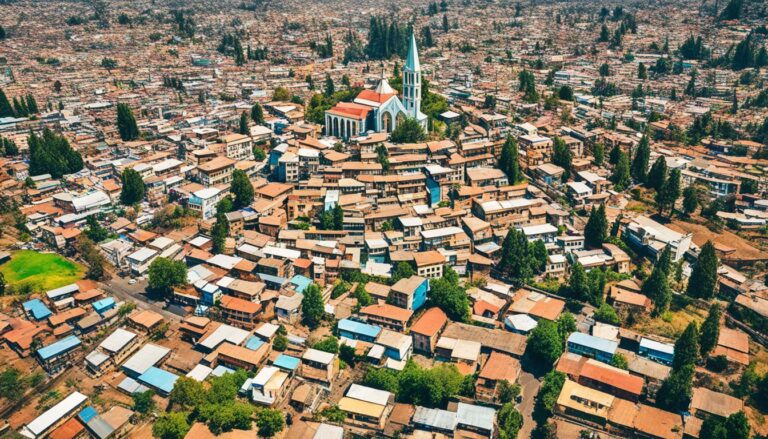What Is The Religious Makeup Of Ethiopia?
Overview of Religious Diversity in Ethiopia
When discussing the religious makeup of Ethiopia, it becomes evident that the country harbors a rich tapestry of faith traditions. The predominant religions in Ethiopia are Christianity and Islam, with Christianity being the most widely practiced. Ethiopian Orthodox Christianity stands out as a cornerstone of the nation’s religious identity, with roots tracing back to the 4th century when Christianity was declared the state religion. The Ethiopian Orthodox Tewahedo Church, an ancient Christian denomination, plays a central role in the lives of many Ethiopians.
In addition to Christianity, Islam holds a significant presence in Ethiopia, particularly in the eastern and southern regions of the country. Islam was introduced in the 7th century through early disciples who sought refuge in the Kingdom of Axum. Over time, Islam took root and flourished, contributing to the diverse religious landscape of Ethiopia. The practice of Islam in Ethiopia is characterized by a mix of Sunni and Sufi traditions, which have interwoven with local Ethiopian customs and beliefs.
Moreover, traditional beliefs and indigenous spiritual practices continue to thrive in Ethiopia alongside organized religions. These ancestral faith systems are deeply rooted in the cultural fabric of the various ethnic groups that make up the country. Indigenous Ethiopian religions often center around reverence for nature, ancestral spirits, and ancient rituals aimed at maintaining harmony with the divine and spiritual world.
This religious diversity in Ethiopia not only shapes the spiritual lives of its people but also influences the country’s social dynamics, cultural expressions, and national identity. The coexistence of multiple faith traditions has fostered a unique sense of religious tolerance and pluralism in Ethiopia, where adherents of different religions often live and work harmoniously together.
The religious makeup of Ethiopia reflects a multifaceted tapestry of beliefs, encompassing Christianity, Islam, and indigenous spiritual practices. This rich diversity underscores the historical, cultural, and social significance of religion in Ethiopia, highlighting the country as a place where faith serves as a unifying force amidst its diverse population.
Historical Development of Religious Practices in Ethiopia
Ethiopia boasts a rich tapestry of religious diversity that has shaped the country’s cultural and historical landscape. The roots of religion in Ethiopia can be traced back thousands of years, evolving over time through a blend of indigenous traditions and external influences. One of the earliest known forms of religious practice in Ethiopia is animism, where elements of nature are revered as spiritual beings. This belief system laid the foundation for the development of more organized religions in the region.
The introduction of Christianity to Ethiopia is credited to the legendary visit of the Queen of Sheba to King Solomon in Jerusalem. This encounter, as depicted in Ethiopian lore, resulted in the birth of Menelik I, who is believed to have brought the Ark of the Covenant to Ethiopia. Christianity was further solidified in the 4th century AD when King Ezana of Axum embraced the faith, making Ethiopia one of the earliest Christian nations in the world. The Ethiopian Orthodox Tewahedo Church, with its unique blend of Judaic-Christian traditions, remains a dominant force in Ethiopian religious life.
Islam also has a significant presence in Ethiopia, with roots dating back to the migration of early Muslim followers seeking refuge from persecution in Mecca. The introduction of Islam to Ethiopia occurred peacefully, and over the centuries, it spread throughout the region, particularly in the eastern parts of the country. The influence of Islam is visible in the architecture, art, and cultural practices of various Ethiopian communities.
In addition to Christianity and Islam, Ethiopia is home to a diverse array of traditional beliefs and indigenous spiritual practices. These often center around nature, ancestral worship, and rituals aimed at maintaining harmony with the spiritual world. Despite the spread of organized religions, many Ethiopians continue to uphold these ancient customs, blending them seamlessly with Christian and Islamic teachings.
The historical development of religious practices in Ethiopia reflects a complex interplay of indigenous traditions, external influences, and cultural exchanges. This multifaceted religious landscape has contributed significantly to Ethiopia’s identity as a country that embraces diversity and tolerance in matters of faith.
Christianity’s Impact on Ethiopian Culture and Society
Christianity has deeply influenced the cultural and social fabric of Ethiopia for centuries. The Ethiopian Orthodox Tewahedo Church, which follows a similar tradition to the Coptic Orthodox Church of Alexandria, has been a significant religious institution in the country since the 4th century. This long-standing presence has left an indelible mark on Ethiopian identity, shaping everything from art and music to literature and architecture.
One notable aspect of Christianity’s influence on Ethiopian culture is the tradition of religious art. Ethiopian Christian art is renowned for its vibrant colors, intricate designs, and unique style that sets it apart from other Christian artistic traditions. Religious paintings, manuscripts, and iconic religious symbols are prevalent in Ethiopian society, serving as a visual representation of the country’s strong Christian heritage.
Furthermore, Ethiopian Christianity has played a crucial role in shaping societal norms and values. The church has been a central pillar in promoting social justice, advocating for the marginalized, and emphasizing the importance of charity and compassion. Many aspects of Ethiopian culture, such as the emphasis on community cohesion and the celebration of religious holidays, are deeply rooted in Christian teachings and practices.
Moreover, Christianity has influenced the governance structure of Ethiopia historically. The Ethiopian monarchy, for instance, drew legitimacy from its close ties to the church, with emperors often portraying themselves as divinely ordained rulers. The Ethiopian Orthodox Church’s influence extended beyond spiritual matters to political and social realms, consolidating its role as a unifying force in Ethiopian society.
In contemporary Ethiopia, Christianity continues to shape cultural practices and societal norms. The observance of religious festivals, adherence to traditional rituals, and the prevalence of Christian symbolism in everyday life underscore the enduring impact of Christianity on Ethiopian identity. Additionally, Christian values such as humility, forgiveness, and communal solidarity remain central to the moral framework of many Ethiopians, guiding their interactions and shaping their worldview.
The influence of Christianity on Ethiopian culture and society is profound and multifaceted, encompassing diverse aspects of artistic expression, social norms, governance structures, and moral values. The enduring presence of Christianity in Ethiopia reflects its deep integration into the country’s history and collective consciousness, highlighting the significant role of religion in shaping Ethiopian identity.
The Role of Islam in Ethiopian Religious Landscape
The religious landscape of Ethiopia is characterized by a rich tapestry of diverse faith traditions, with Islam playing a significant role in shaping the country’s spiritual dynamics. Islam in Ethiopia has a long and storied history, dating back to the early days of the Islamic faith. Today, Muslims make up a substantial portion of the Ethiopian population, contributing to the country’s religious pluralism and cultural heritage.
Islam was introduced to Ethiopia in the early 7th century, following the migration of early Muslims seeking refuge from persecution in Mecca. The Prophet Muhammad had instructed his followers to seek refuge in the Christian Kingdom of Axum, present-day Ethiopia, where they were welcomed by the Christian ruler. This historical event, known as the First Hijra, laid the foundation for the enduring presence of Islam in Ethiopia.
Over the centuries, Islam flourished in Ethiopia, particularly in the eastern and southern regions of the country. The Ethiopian Islamic community is primarily composed of Sunni Muslims, adhering to the teachings of the Quran and the traditions of the Prophet Muhammad. Islamic practices and beliefs have become deeply embedded in the social fabric of Ethiopian society, influencing various aspects of cultural expression and communal life.
One of the most significant contributions of Islam to Ethiopian society is the promotion of social cohesion and mutual assistance among believers. The concept of brotherhood and solidarity within the Muslim community, known as Ummah, emphasizes the importance of charity, compassion, and support for those in need. Muslim communities in Ethiopia often engage in philanthropic activities, such as providing food aid, healthcare services, and educational opportunities to vulnerable populations.
In addition to its social impact, Islam has also left a profound mark on Ethiopian art, architecture, and literature. The country is home to numerous mosques, shrines, and religious schools that reflect the rich Islamic heritage of the region. Islamic calligraphy, geometric patterns, and traditional music are prominent features of Ethiopian cultural expression, showcasing the fusion of Islamic and local artistic traditions.
Islam plays a vital role in the religious mosaic of Ethiopia, contributing to the country’s cultural diversity and spiritual vitality. The peaceful coexistence of multiple faith traditions, including Christianity and traditional beliefs, underscores the inclusive and tolerant nature of Ethiopian society. As Islam continues to thrive and evolve within the Ethiopian context, its enduring legacy will undoubtedly shape the country’s religious landscape for generations to come.
Exploring Traditional Beliefs and Indigenous Spiritual Practices in Ethiopia
When delving into the religious makeup of Ethiopia, it is essential to consider the rich tapestry of traditional beliefs and indigenous spiritual practices that have long been intertwined with the cultural fabric of the nation. Ethiopia boasts a diverse array of traditional belief systems that predate the arrival of Christianity and Islam, reflecting the heritage of various ethnic groups and communities across the country.
One prominent aspect of traditional Ethiopian spirituality is the practice of ancestral veneration, where ancestors are revered and honored for their wisdom and guidance. Ancestor worship plays a significant role in many Ethiopian communities, with rituals and ceremonies designed to pay homage to those who have passed on.
Furthermore, traditional Ethiopian religious practices often involve a deep connection to nature and the spiritual world. Many indigenous belief systems in Ethiopia emphasize the importance of living in harmony with the natural environment and recognizing the presence of spiritual beings in the physical realm.
Moreover, rituals such as offerings, sacrifices, and ceremonies are common in traditional Ethiopian spirituality, aimed at appeasing spirits, seeking protection, or invoking blessings from the divine. These practices are deeply rooted in the cultural traditions of various ethnic groups and are passed down through generations as a way of connecting with the spiritual realm.
It is important to note that traditional Ethiopian beliefs are not monolithic but vary widely across different regions and communities. Each ethnic group in Ethiopia may have its unique set of spiritual practices, myths, and rituals that shape the religious landscape of the country.
The traditional beliefs and indigenous spiritual practices in Ethiopia offer a fascinating glimpse into the diverse religious heritage of the nation. From ancestral veneration to a deep reverence for nature, these traditional practices continue to play a significant role in shaping the cultural identity of Ethiopian communities and enriching the religious tapestry of the country.
Conclusion
In Ethiopia, the religious landscape is a rich tapestry woven with diverse threads of faith that have shaped the country’s history, culture, and society. From ancient times to the present day, Ethiopia has been home to a multitude of religious beliefs and practices that reflect its unique blend of influences from Christianity, Islam, traditional beliefs, and indigenous spiritual practices.
The historical development of religious practices in Ethiopia dates back to early civilizations, with Christianity becoming a dominant faith since the 4th century. The Ethiopian Orthodox Tewahedo Church has played a central role in shaping the country’s identity, traditions, and way of life. Christianity’s influence on Ethiopian culture and society is evident in its art, music, literature, and architecture, as well as in the daily lives of its people.
Islam also has a significant presence in Ethiopia, with a long history dating back to the early days of the religion. Muslims in Ethiopia have contributed to the country’s cultural and religious diversity, with mosques and Islamic schools being integral parts of Ethiopian communities. The practice of Islam in Ethiopia is marked by a unique blend of Sufi traditions and local customs that have evolved over centuries.
In addition to Christianity and Islam, Ethiopia is also home to a variety of traditional beliefs and indigenous spiritual practices that predate the arrival of organized religions. These beliefs often revolve around nature, ancestral spirits, and the supernatural, and continue to play a role in the lives of many Ethiopians, especially in rural areas and among marginalized communities.
The coexistence of multiple faith traditions in Ethiopia has led to a complex religious landscape that is characterized by tolerance, diversity, and mutual respect. While there have been instances of tension and conflict between different religious groups, Ethiopia’s history is also marked by periods of peaceful coexistence and collaboration among followers of different faiths.
The religious makeup of Ethiopia reflects the country’s long and intricate history of spiritual exploration, cultural exchange, and social integration. As Ethiopia continues to navigate the challenges of the modern world while honoring its rich religious heritage, the diverse tapestry of faith that defines the country serves as a reminder of the enduring power of belief, tradition, and community in shaping the destiny of a nation.





